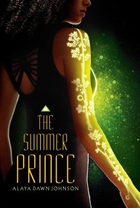The Summer Prince by Alaya Dawn Johnson is a unique but, for me, slightly unsatisfying dystopia.
In a future Brazil, June Costa lives in the matriarchal society of Palmares Tres, a floating city-state in the middle of the bay. Her eighteenth year is an exciting one: it's the year that the Summer King will come from among the wakas, the citizens under thirty. In Palmares Tres, the older adults have most of the political power, but June's generation is still frenzied with excitement over the election. June and her best friend Gil are hoping that charismatic Enki, a dancer from the lowest tier of society will win -- even though winning would mean his death, something that all candidates for Summer King well know. After a year of power and excess, the Summer King selects the next ruling queen . . . and is slaughtered. It's a ritual that dates back to just after the nuclear war, when the government was just being established and the Y Plague was still killing off 70% of the society's men, when men were being blamed for the ruin of the world and women took charge of the country. But something will be different about this year, about this Summer King, though nobody knows it yet, and the fallout will change Palmares Tres forever.
I've heard this book heralded as the best YA fiction of the year, and I've heard people say that they couldn't even get through the first few chapters. It's a complicated book, and the author makes the choice to write without info-dumping, so readers must pick up on the details of June's world through subtle clues rather than chunks of description and explanation. To top that off, the world's Brazilian roots will be unfamiliar to many readers. It's a rich and complex world, and I really enjoyed ferreting out those details, though thre are parts of the story that I never did exactly figure out to my satisfaction. But my main issue with the book is that I had a hard time caring about any of the characters. June is too self-centered, Enki less than, or other than, human, and Gil too flat to be really relatable. I also found that I enjoyed the story most when I could tune out the dystopia and the connections to our world, and just take it as a sci-fi story, because the idea of a future government where ritual human sacrifice was an accepted tradition strained my credulity. Readers who love a gritty, bloody dystopia will probably enjoy this, but it's not one I will revisit.
(Reviewed from a copy borrowed through my library system.)

No comments:
Post a Comment